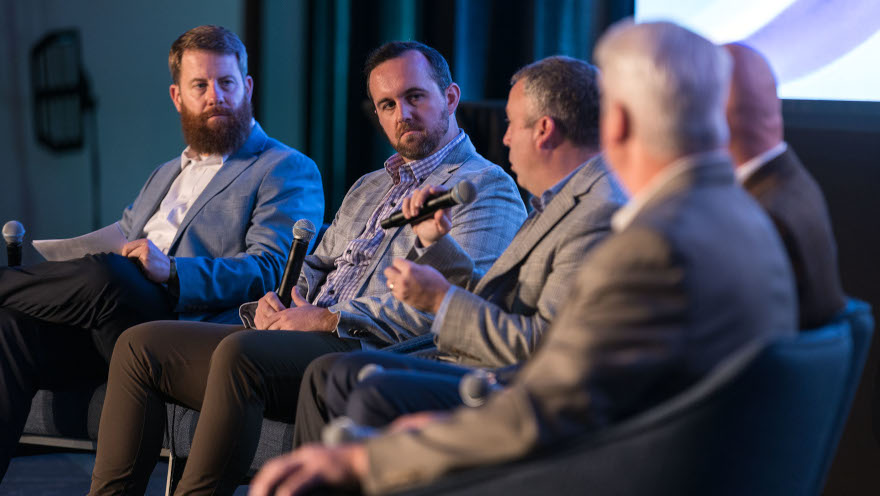Why M&A has accelerated in auto auction space

Action from the “Exploring the Auto Auction Buy-Sell Market” panel at Used Car Week. Photo by Jonathan Fredin.
By subscribing, you agree to receive communications from Auto Remarketing and our partners in accordance with our Privacy Policy. We may share your information with select partners and sponsors who may contact you about their products and services. You may unsubscribe at any time.
For decades, M&A and buy-sell has been a part of the auto auction industry — and, really, most any industry with a constituency mix of corporately and independently owned businesses experiences consolidation.
But the moves in the last three years have arguably led to the greatest change in the auto auction landscape in decades.
In December 2021, America’s Auto Auction and XLerate Group merged, creating what is now the nation’s third-largest and most rapidly expanding auction chain, America’s Group.
KAR Global, now known as OPENLANE, sold its U.S. ADESA auctions to Carvana in a deal announced in February 2022.
Cox Automotive sold its Manheim Canada operations to OPENLANE in December 2023.
Amid all these moves, two of the largest digital players in wholesale, ACV and EBlock, have each purchased multiple physical auctions.
Subscribe to Auto Remarketing to stay informed and stay ahead.
By subscribing, you agree to receive communications from Auto Remarketing and our partners in accordance with our Privacy Policy. We may share your information with select partners and sponsors who may contact you about their products and services. You may unsubscribe at any time.
So, what has led to this uptick in buy-sell?
John Healy, who is managing director and equity research analyst at Northcoast Research, said there are three factors likely driving the M&A activity.
First, he said during a panel discussion at Used Car Week, is the history behind the various auto auction players.
“You look at this industry in itself, and this isn’t necessarily an organically built business model. The large chains that have existed and forces in this industry for decades were the output of M&A, whether it’s in auto itself, whether it’s in salvage, whether it’s in industrial goods,” Healy said.
Another driver has been the need for infrastructure, even for digital providers, several of which have emphasized the importance of land and physical structures, he said.
“I think land is important. I think that asset is something that a lot of investors underestimated. And when you look at the growth in terms of capital markets the last decade or so, Carvana and ACV are probably the two success stories in the automotive space,” Healy said.
“And it’s really interesting to look at those companies now and realize, wow, they’re in the physical auction business,” he said. “It’s become a huge part of their plans going forward.”
There has also been a “pivot” in the wholesale space, Healy said.
“Whether you’re selling cars or motorcycles or boats or bikes or what have you, there’s a little bit of a ceiling on the market,” he said. “And what we’ve seen is a lot of external auction entities move from looking at their business on selling units to now talking about selling as a platform in gross transaction volume.
“So you’re looking for adjacencies to those competencies. And I think you see that with some of the forces that have been in the market the last year or two.”
John Poteet founded Louisiana’s 1st Choice Auto Auction, which he owned and managed for 20 years before selling the auction to EBlock in 2022. He’s now an industry associate and management advisor at TPC Management Co., focusing on the firm’s advisory work with auction owners evaluating whether to sell their businesses, and assisting independent auction owners in preparing for sale.
“It’s very difficult to grow an auction or to start an auction from scratch. And a lot of people who are running auctions today, independent auctions, small auctions, medium-sized auctions, they’ve worked very hard to build this up. And a lot of them don’t have the … financial infrastructure, to expand,” Poteet said during UCW’s “Exploring the Auto Auction Buy-Sell Market” panel, where he joined Healy and fellow remarketing executives.
“They’re either at an age or they’re at a point in their career where they need to be thinking about what is next,” Poteet said. “And in my case, we sold our auction to EBlock. And one of the things that drove that for us was …
To access the full report and additional insights into the M&A landscape within the auto auction segment — as well as expert insights into buy-sell within auto retail and auto finance — download Cherokee Media Group’s latest whitepaper here:
State of the Used Car Industry – Winter 2024 – Cherokee Media Group


